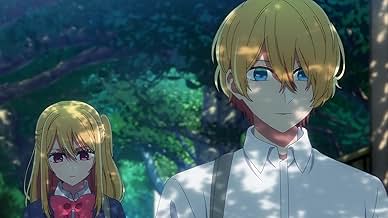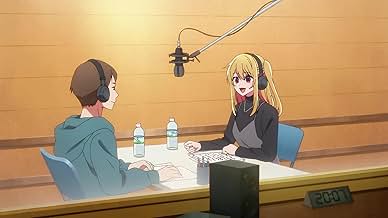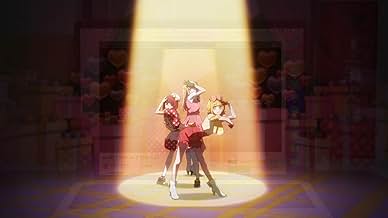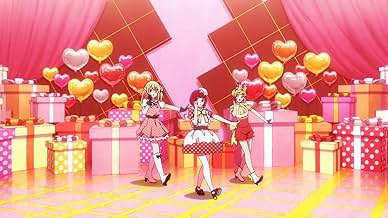Gorō, un medico recentemente scomparso e la sua paziente morta, Sarina, rinascono come figli gemelli di una famosa stella della musica giapponese. Con nuove vite navigano negli alti e bassi ... Leggi tuttoGorō, un medico recentemente scomparso e la sua paziente morta, Sarina, rinascono come figli gemelli di una famosa stella della musica giapponese. Con nuove vite navigano negli alti e bassi dell'industria dell'intrattenimento giapponese.Gorō, un medico recentemente scomparso e la sua paziente morta, Sarina, rinascono come figli gemelli di una famosa stella della musica giapponese. Con nuove vite navigano negli alti e bassi dell'industria dell'intrattenimento giapponese.
- Premi
- 19 vittorie e 38 candidature totali
Sfoglia gli episodi
Recensioni in evidenza
I really must say that how they did the first episode is really Genius, and when I say Genius I mean that they started this Anime in a really great way that is easy to understand the story and everything that is going on, and to tell you it in a better way what they did is instead of making a normal 24 minute long Anime episode they did a 82 minute long Anime episode, then in that episode they told us all the important stuff that we need to know, and they did that in such a good way that this first episode was Genius. The animation is really amazing the art style is beautiful the music/OSTs are nice, and pretty much there is nothing to complain about. What I really like about this Anime is that it starts really chilli and then becomes really dark, even though you already know it will happen from the start I still like it that way, and when I say "I like it that way" I mean that I like Animes that start nicely and cute and then become dark and sad. Overall yeah I really recommend you to give this a try you can like it or you can dislike it, afterall the decision is yours.
To be honest, before I started watching this anime I read the story synopsis and glanced through the genre and I was sure that this isn't my cup of tea and I wouldn't even up completing 2 episodes of this anime but DAMN I was so wrong and I m so glad I was. This anime adaptation did so many things right from animation to story telling, right pacing and other intricate things, really kept me hooked till the end. And Cheers to opening and ending songs, loved it. I m beyond satisifed, "AARIGATO" to everyone involved in its making from manga to anime, its a masterpiece. Looking forward to Season 2.
10aktnmrb
The first episode of the anime was very satisfying. I like! If the anime's theme is revenge and events revolve around Aqua, this anime deserves more than 10 stars! His drawings are fascinating! I hope the next episodes will be of the same quality. Good luck to the illustrators! Ai's death was sad. If there's revenge in the anime, I'd like some action and blood too. This anime will be more fun and beautiful! Frankly, I don't want Ruby to be too prominent. I want it to focus more on Aqua. Because he will be our hero who will take revenge. I hope he draws and writes, sees this comment and makes progress accordingly. I wish you success and once again!
Lies. Who among us hasn't told a lie or two? Whether it's telling a white lie or presenting a false version of ourselves. Celebrities, actors, musicians, and artists must constantly maintain a public image, which may require telling a lie or two. As a famous idol, Ai Hoshino's life revolves around lying. "The lie becomes the truth" are words she lives by. She lies to her friends and fans, but no one can see through the facade beneath her starry eyes.
Oshi no Ko's most provocative scene tragically occurs in its feature-length premiere. The tearjerker ending propelled the series into popularity, leading to disappointment when the rest proved to be an entirely different beast. Some viewers may build false expectations, but those who approach it open-mindedly will enjoy where it takes them. The premiere was a well-written story best left in the past. It initially evokes the untouchable masterpiece Perfect Blue, but aside from the final scene, the juvenile execution pales in comparison.
The episodes after the premiere are more refreshing. Oshi no Ko's content is comparable to my all-time favorite anime, Kaleido Star, for its realistic approach to performing arts while maintaining an uplifting message. It never shies away from showing singers, dancers, and actors' struggles to preserve their image and criticize demanding audiences. Writer Aka Akasaka does not condemn consumers but provides a mirror to reflect on their behavior. Oshi no Ko honestly portrays the Japanese acting and idol industry. Seeing how child actors phase out, stunt casting, agency competitions, and differences between writers and studios add to the realism. There are many things they should have taken into account, such as numerous reshoots, scheduling, and post-production. They seemingly picked and chose the most exciting parts of show business to portray and ignored the less appealing but equally crucial aspects.
Through Ai Hoshino's twin son and daughter, the series explores the ups and downs of acting and idol careers, respectively. Both children secretly lived past lives, in which they adored Ai. Her son, Aquamarine, was Ai's gynecologist, murdered by her stalker. Her daughter Ruby was only a young girl when she died of cancer. They take their reincarnations surprisingly well, but who wouldn't when you get around-the-clock attention from your favorite celebrity? Well, probably some people. The kids pursue futures that live up to their mother's legacy and do right by her. For Ruby, this means carrying on Ai's legacy as an idol and rebuilding her group B-Komachi from the ground up. For Aqua, it's rather intense; he dedicates his life to searching for their absent father, putting aside any personal goals. Aqua and Ruby attend Yoto High School, which offers a performing arts program only for students attached to a talent agency. Luckily for the kids, Ai's previous manager Miyako Saito adopted them and made them part of her company.
A common critique of Oshi no Ko is that the reincarnation plot device is unnecessary. I disagree with that judgment because it's necessary to advance the plot. Aquamarine uses his skills of talking to seniors as a doctor in his past life to smooth talk a director, which gets his mother a film role. He uses his people skills to dig up clues to track down his lost father. Unlike many other high school geniuses in anime, Aqua behaves like an adult due to his reincarnation; it is better that the plot provides a reason other than the simple notion that he's a prodigy. Some viewers may find Aqua's infatuation with Ai overwhelming, and it is nearly an oedipal nightmare. Still, it rides the line carefully-quickly reminding us that his love for Ai is admiration, not romance. Ruby's past life provides an obstacle to overcome rather than skill. She struggles with dancing, a crucial skill as an idol, partly because having cancer made it difficult for her to dance, causing her to have difficulty with her mindset. Aqua and Ruby are deeply flawed, socially awkward, and very traumatized, like the other characters.
The side characters stand out with vibrant personalities that leave a lasting impression without gimmicks. Each character possesses their own set of goals, struggles, flaws, and endearing qualities. Among them is Kana Arima, a former child prodigy in acting who now finds herself a mediocre teenage actor. With a theater kid persona, Kana exudes excessive confidence that can seem condescending. However, her knack for maneuvering within the industry helps her secure roles. Like others, her character development involves confronting inner demons caused by past trauma and present triggers. As a freelancer, she often gets trapped in undesirable parts. However, when she joins Ruby to form their idol group B-Komachi, Kana discovers self-respect. Together, they build their team from scratch, with relentless effort and determination.
Another key supporting character is Akane, an up-and-coming actress who works alongside Aqua on a reality TV dating show. Through Akane's arc, the writer explores a theme touched on during the premiere. Social media: How it helps and harms performance artists. There's a focus on positive and negative responses to Aquamarine's TV shows, but it peaks with online hate and canceling Akane faces. Harassment's disastrous effects on her mental health are realistic and portrayed with uncommon sensitivity. Regardless of how the arc plays out, it is cathartic to see the people responsible for her turmoil condemned by the author. This includes the grossly misogynistic haters online and the scumbag producer of their reality TV show.
Aside from the tearjerker premiere, Oshi no Ko manages a few other genuinely moving moments-a mental health crisis and a near breakdown before a major performance-but surrounding those is a bit of contrived drama. Aqua's slow quest to find his father loses steam quickly. However, future seasons can revive that subplot. Ruby must navigate rising as an idol, a path well-worn by music anime. Though they mostly avoid pedestrian school drama, there's romance stalled by misunderstandings. It's as if the anime keeps seeking narrative conflict when there is plenty to dig into with the characters' turmoils-especially Ruby and Aqua's rich history. Tell us more about how their past lives inform their present! And it would've been fascinating to learn more about their adoptive mother; surely, a chapter or two can be spared for her. Despite the story's slight drawbacks, it's consistently elevated by one of Doga Kobo's most impressive presentations alongside Monthly Girls' Nozaki-kun.
Although it is less well-directed than Akasaka's prior adaptation, Love is War, Daisuke Hiramaki handles the drama in Oshi no Ko excellently. The combination of orchestral background music and close-up shots creates a sense of immersion during the dramatic scenes. With soaring melodies and dynamic arrangements, orchestral compositions heighten the emotional intensity. As the music swells, it accentuates everything felt by the characters; anguish, joy, and depression, evoking an impactful response from the audience. Furthermore, the well-timed close-up shots sweeten the effect of these moments by capturing the characters' raw expressions.
Oshi no Ko delves into the intricate world of lies and facades that permeate celebrities' and performers' lives. It explores the challenges and consequences of maintaining a public image while delving into its characters' personal trauma. While the tearjerker premiere may have set high expectations that the subsequent episodes couldn't fully meet, the series delivers refreshing and immersive portrayals of the performing arts. The reincarnation plot device, although debated, advances the storyline. The side characters shine with their distinctive personalities and genuine character development, with Kana and Akane standing out as memorable figures. Despite some contrived drama and missed opportunities for deeper exploration, Oshi no Ko is consistently elevated by Doga Kobo's strong presentation. Ultimately, the anime provides a cathartic experience, while taking the coming-of-age genre from a fresh angle.
Oshi no Ko's most provocative scene tragically occurs in its feature-length premiere. The tearjerker ending propelled the series into popularity, leading to disappointment when the rest proved to be an entirely different beast. Some viewers may build false expectations, but those who approach it open-mindedly will enjoy where it takes them. The premiere was a well-written story best left in the past. It initially evokes the untouchable masterpiece Perfect Blue, but aside from the final scene, the juvenile execution pales in comparison.
The episodes after the premiere are more refreshing. Oshi no Ko's content is comparable to my all-time favorite anime, Kaleido Star, for its realistic approach to performing arts while maintaining an uplifting message. It never shies away from showing singers, dancers, and actors' struggles to preserve their image and criticize demanding audiences. Writer Aka Akasaka does not condemn consumers but provides a mirror to reflect on their behavior. Oshi no Ko honestly portrays the Japanese acting and idol industry. Seeing how child actors phase out, stunt casting, agency competitions, and differences between writers and studios add to the realism. There are many things they should have taken into account, such as numerous reshoots, scheduling, and post-production. They seemingly picked and chose the most exciting parts of show business to portray and ignored the less appealing but equally crucial aspects.
Through Ai Hoshino's twin son and daughter, the series explores the ups and downs of acting and idol careers, respectively. Both children secretly lived past lives, in which they adored Ai. Her son, Aquamarine, was Ai's gynecologist, murdered by her stalker. Her daughter Ruby was only a young girl when she died of cancer. They take their reincarnations surprisingly well, but who wouldn't when you get around-the-clock attention from your favorite celebrity? Well, probably some people. The kids pursue futures that live up to their mother's legacy and do right by her. For Ruby, this means carrying on Ai's legacy as an idol and rebuilding her group B-Komachi from the ground up. For Aqua, it's rather intense; he dedicates his life to searching for their absent father, putting aside any personal goals. Aqua and Ruby attend Yoto High School, which offers a performing arts program only for students attached to a talent agency. Luckily for the kids, Ai's previous manager Miyako Saito adopted them and made them part of her company.
A common critique of Oshi no Ko is that the reincarnation plot device is unnecessary. I disagree with that judgment because it's necessary to advance the plot. Aquamarine uses his skills of talking to seniors as a doctor in his past life to smooth talk a director, which gets his mother a film role. He uses his people skills to dig up clues to track down his lost father. Unlike many other high school geniuses in anime, Aqua behaves like an adult due to his reincarnation; it is better that the plot provides a reason other than the simple notion that he's a prodigy. Some viewers may find Aqua's infatuation with Ai overwhelming, and it is nearly an oedipal nightmare. Still, it rides the line carefully-quickly reminding us that his love for Ai is admiration, not romance. Ruby's past life provides an obstacle to overcome rather than skill. She struggles with dancing, a crucial skill as an idol, partly because having cancer made it difficult for her to dance, causing her to have difficulty with her mindset. Aqua and Ruby are deeply flawed, socially awkward, and very traumatized, like the other characters.
The side characters stand out with vibrant personalities that leave a lasting impression without gimmicks. Each character possesses their own set of goals, struggles, flaws, and endearing qualities. Among them is Kana Arima, a former child prodigy in acting who now finds herself a mediocre teenage actor. With a theater kid persona, Kana exudes excessive confidence that can seem condescending. However, her knack for maneuvering within the industry helps her secure roles. Like others, her character development involves confronting inner demons caused by past trauma and present triggers. As a freelancer, she often gets trapped in undesirable parts. However, when she joins Ruby to form their idol group B-Komachi, Kana discovers self-respect. Together, they build their team from scratch, with relentless effort and determination.
Another key supporting character is Akane, an up-and-coming actress who works alongside Aqua on a reality TV dating show. Through Akane's arc, the writer explores a theme touched on during the premiere. Social media: How it helps and harms performance artists. There's a focus on positive and negative responses to Aquamarine's TV shows, but it peaks with online hate and canceling Akane faces. Harassment's disastrous effects on her mental health are realistic and portrayed with uncommon sensitivity. Regardless of how the arc plays out, it is cathartic to see the people responsible for her turmoil condemned by the author. This includes the grossly misogynistic haters online and the scumbag producer of their reality TV show.
Aside from the tearjerker premiere, Oshi no Ko manages a few other genuinely moving moments-a mental health crisis and a near breakdown before a major performance-but surrounding those is a bit of contrived drama. Aqua's slow quest to find his father loses steam quickly. However, future seasons can revive that subplot. Ruby must navigate rising as an idol, a path well-worn by music anime. Though they mostly avoid pedestrian school drama, there's romance stalled by misunderstandings. It's as if the anime keeps seeking narrative conflict when there is plenty to dig into with the characters' turmoils-especially Ruby and Aqua's rich history. Tell us more about how their past lives inform their present! And it would've been fascinating to learn more about their adoptive mother; surely, a chapter or two can be spared for her. Despite the story's slight drawbacks, it's consistently elevated by one of Doga Kobo's most impressive presentations alongside Monthly Girls' Nozaki-kun.
Although it is less well-directed than Akasaka's prior adaptation, Love is War, Daisuke Hiramaki handles the drama in Oshi no Ko excellently. The combination of orchestral background music and close-up shots creates a sense of immersion during the dramatic scenes. With soaring melodies and dynamic arrangements, orchestral compositions heighten the emotional intensity. As the music swells, it accentuates everything felt by the characters; anguish, joy, and depression, evoking an impactful response from the audience. Furthermore, the well-timed close-up shots sweeten the effect of these moments by capturing the characters' raw expressions.
Oshi no Ko delves into the intricate world of lies and facades that permeate celebrities' and performers' lives. It explores the challenges and consequences of maintaining a public image while delving into its characters' personal trauma. While the tearjerker premiere may have set high expectations that the subsequent episodes couldn't fully meet, the series delivers refreshing and immersive portrayals of the performing arts. The reincarnation plot device, although debated, advances the storyline. The side characters shine with their distinctive personalities and genuine character development, with Kana and Akane standing out as memorable figures. Despite some contrived drama and missed opportunities for deeper exploration, Oshi no Ko is consistently elevated by Doga Kobo's strong presentation. Ultimately, the anime provides a cathartic experience, while taking the coming-of-age genre from a fresh angle.
Personally when I first saw this anime, and saw it was getting popular and I thought: "oh great another weird looking anime getting popular". But one day I decided to read the basic plot description, and I thought, like most people would... it sounds weird. But then as a joke a decided to start watching this. First off a 1 hour first episode seems weird, but it was worth it. Second, with out spoiling anything... the plot summary is a tad bit misleading. And third and final, I may or may not have watched this all in the span of 1 day cause it was so good. Basically I relearned the lesson of: Don't judge a book by its cover (or should I say anime)
Lo sapevi?
- QuizThe title has 2 possible meanings Oshi means "to Push" or Support. Ko is usually used to refer to a person or a Girl. Putting them together means "the Girl that Supports you" in reference to Ai supporting Ruby & Aqua in their past lives as an Idol. However, Oshi is also often a term used by Idol fans for their Favorite Idols that they Support & Ko can be a term for "Child". Meaning the title can also be said as "the Child of the Idol you Support." In reference to Ruby & Aqua's new lives as AI's Children.
- ConnessioniRemade as Oshi no Ko (2024)
I più visti
Accedi per valutare e creare un elenco di titoli salvati per ottenere consigli personalizzati
- How many seasons does Oshi No Ko have?Powered by Alexa
Dettagli
- Tempo di esecuzione24 minuti
- Colore
- Mix di suoni
- Proporzioni
- 1.78 : 1
- 2.00 : 1
Contribuisci a questa pagina
Suggerisci una modifica o aggiungi i contenuti mancanti

Divario superiore
What is the Canadian French language plot outline for Oshi no ko - My Star (2023)?
Rispondi



























